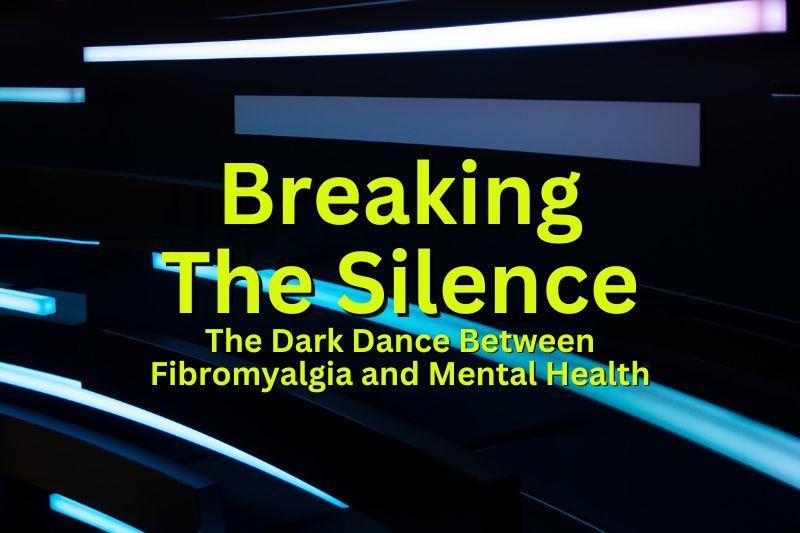The Dark Dance Between Fibromyalgia and Mental Health
 Fibromyalgia is a complex and chronic condition characterized by widespread musculoskeletal pain, fatigue, sleep disturbances, and cognitive difficulties. While the exact cause of fibromyalgia is unknown, researchers believe that it involves a combination of genetic, environmental, and psychological factors. Mental health plays a significant role in the development, severity, and management of fibromyalgia symptoms.
Fibromyalgia is a complex and chronic condition characterized by widespread musculoskeletal pain, fatigue, sleep disturbances, and cognitive difficulties. While the exact cause of fibromyalgia is unknown, researchers believe that it involves a combination of genetic, environmental, and psychological factors. Mental health plays a significant role in the development, severity, and management of fibromyalgia symptoms.
Here’s a closer look at the link between fibromyalgia and mental health:
 Stress and Trauma: Stressful life events, including physical or emotional trauma, can trigger the onset of fibromyalgia or exacerbate existing symptoms. Individuals with a history of trauma, such as post-traumatic stress disorder (PTSD), may be more susceptible to developing fibromyalgia.
Stress and Trauma: Stressful life events, including physical or emotional trauma, can trigger the onset of fibromyalgia or exacerbate existing symptoms. Individuals with a history of trauma, such as post-traumatic stress disorder (PTSD), may be more susceptible to developing fibromyalgia.
Depression and Anxiety: There is a strong association between fibromyalgia and depression or anxiety disorders. Many people with fibromyalgia experience depressive symptoms, such as persistent sadness, loss of interest, and feelings of worthlessness. Anxiety disorders, including generalized anxiety disorder and panic disorder, are also common among fibromyalgia patients.
The pain and limitations caused by fibromyalgia can increase the risk of developing depression and anxiety. Share on X Sleep Disturbances: Fibromyalgia often leads to sleep disturbances, including insomnia and non-restorative sleep. Lack of quality sleep can contribute to mood disorders like depression and anxiety, and it can also worsen pain sensitivity and cognitive function.
Sleep Disturbances: Fibromyalgia often leads to sleep disturbances, including insomnia and non-restorative sleep. Lack of quality sleep can contribute to mood disorders like depression and anxiety, and it can also worsen pain sensitivity and cognitive function.
Central Sensitization: Fibromyalgia is believed to involve central sensitization, a process in which the central nervous system becomes more sensitive to pain signals. This heightened pain perception can be influenced by emotional and psychological factors. Stress, anxiety, and negative emotions can amplify pain perception and make fibromyalgia symptoms more severe.
Mental health plays a significant role in the development, severity, and management of fibromyalgia symptoms. Share on X Impact on Quality of Life: The chronic pain, fatigue, and other symptoms associated with fibromyalgia can significantly impact an individual’s quality of life. Constant pain and fatigue can lead to feelings of frustration, helplessness, and social isolation. The psychological distress resulting from these factors can further exacerbate fibromyalgia symptoms.
Impact on Quality of Life: The chronic pain, fatigue, and other symptoms associated with fibromyalgia can significantly impact an individual’s quality of life. Constant pain and fatigue can lead to feelings of frustration, helplessness, and social isolation. The psychological distress resulting from these factors can further exacerbate fibromyalgia symptoms.
Bidirectional Relationship: The relationship between fibromyalgia and mental health is bidirectional. Fibromyalgia can lead to mental health issues, and vice versa. The pain and limitations caused by fibromyalgia can increase the risk of developing depression and anxiety. On the other hand, mental health conditions can contribute to the development of fibromyalgia or worsen its symptoms.
Individuals with a history of trauma, such as post-traumatic stress disorder (PTSD), may be more susceptible to developing fibromyalgia. Share on XIt’s important to address both the physical and mental aspects of fibromyalgia in order to manage the condition effectively. Treatment approaches may include a combination of medication, physical therapy, cognitive-behavioral therapy, stress management techniques, and lifestyle changes.
By addressing mental health concerns and implementing strategies to reduce stress and improve overall well-being, individuals with fibromyalgia can often experience better symptom management and an improved quality of life.



